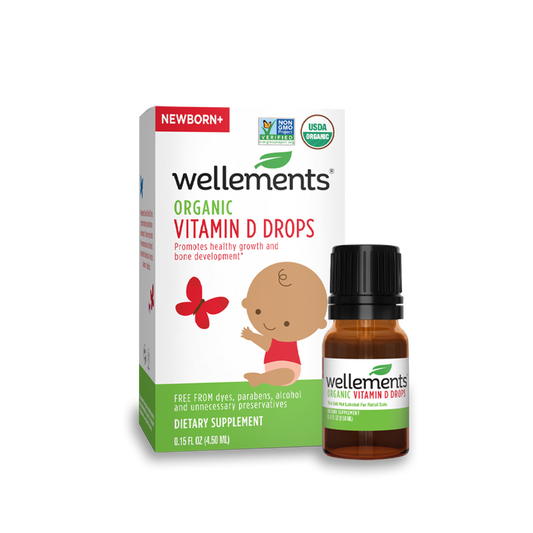400 IU: Daily Recommendation of Vitamin D for Babies
| updated:Share

You want to make sure you give your newborn the best possible nutrition, including the building blocks for strong bones. Unfortunately, many moms and babies don't get the desired daily dosage of vitamin D from the foods they eat. In addition to supporting musculoskeletal health, vitamin D boosts the immune system and may ward off certain types of cancer. Review these vitamin D recommendations to provide your little one with the nutrients for healthy growth.
What Does IU Mean?
You'll notice that vitamin D supplements are measured as "IU." IU stands for international unit, which measures a globally accepted amount of a specific substance. For vitamin D, the daily recommendation of 400 IU for infants equals about 10 micrograms.
IU primarily measures vitamin and insulin dosage and varies based on the substance in question. For example, an IU of vitamin D is not the same as an IU of vitamin A, C or E.
Daily Vitamin D Recommendation if You Are Breastfeeding vs Bottle Feeding
The American Academy of Pediatrics recommends supplementing breast milk with 400 daily IU of vitamin D within the first few days of your baby's life. Formula-fed babies should consume approximately 1 daily quart of formula fortified with vitamin D. Getting extra vitamin D with a supplement is especially important if you live in an area where your baby may have limited sun exposure during the winter months or if your baby has dark skin. Also, remember that babies should not be directly exposed to the sun before 6 months of age.
In addition to vitamin D supplements for infants, moms should also make sure they get enough daily vitamin D. Johns Hopkins Medicine says that most women should consume at least 600 IU of vitamin D per day. You can find vitamin D in fatty fish such as salmon, fortified milk, fortified cereal, mushrooms and egg yolks. You can also spend 15 to 20 minutes in the sun each day to boost your vitamin D intake. Don't forget to protect your skin with sunscreen of at least SPF 30.
Many people still need a supplement in addition to vitamin D from diet and the sun. This especially applies to women at higher risk for vitamin D deficiency. You are more likely to be low on vitamin D if you:
- Have a body mass index of 30 or higher
- Have had weight loss surgery
- Have Crohn's disease, cystic fibrosis, or celiac, kidney, or liver disease
- Take certain medications, including steroids, laxatives, drugs to lower cholesterol, seizure medications and weight loss drugs
A lack of vitamin D increases the risk for bone density loss and subsequently fractures, especially as we age.
4.1 /
5.0
(90)
90
total reviews
Vitamin D Drops
Sale price
$11.99
Can You Give Your Baby Too Much Vitamin D?
Too much vitamin D intake can cause unwanted side effects. Exceeding the daily vitamin D recommendation can cause poor appetite, vomiting and constipation, so if your baby develops tummy troubles it's best to see your pediatrician.
Infants should get no more than 1,500 IU of vitamin D a day. The maximum for children ages 1 to 8 is 3,000 IU, while older children and adults should get no more than 4,000 IU a day. However, vitamin D toxicity is very rare and cannot result from too much sun exposure. In fact, research reported by the National Institutes of Health indicates that up to 42% of adults are low on vitamin D.
Daily IU vitamin D supplements should continue through your baby's first birthday and beyond. The Centers for Disease Control and Prevention estimate that up to 21% of children don't get enough dietary vitamin D, putting them at risk for bone and muscle pain, weakness, fatigue and even depression. Kids ages 1 and older should get 600 IU of vitamin D supplements each day to support healthy musculoskeletal development.
References:
https://www.cdc.gov/breastfeeding-special-circumstances/about/index.html
https://www.cdc.gov/infant-toddler-nutrition/vitamins-minerals/vitamin-d.html



